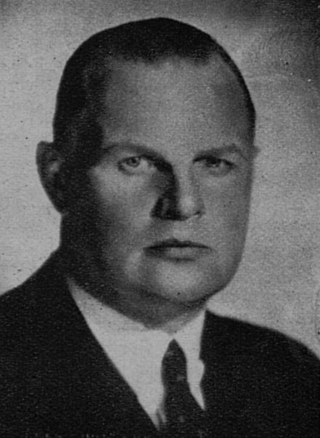
Jyväskylä is a city in Finland and the regional capital of Central Finland. It is located in the Finnish Lakeland. The population of Jyväskylä is approximately 148,000, while the sub-region has a population of approximately 191,000. It is the 7th most populous municipality in Finland, and the fifth most populous urban area in the country.

The University of Jyväskylä is a research university in Jyväskylä, Finland. It has its origins in the first Finnish-speaking Teacher Training College, founded in 1863. Around 14,000 students are currently enrolled in the degree programs of the university.
Heikki Aleksi "Ale" Riipinen was a Finnish gymnast who won bronze in the 1908 Summer Olympics.

Kaarlo Eino Kyösti Soinio was a Finnish sportsperson, who won an Olympic bronze, and a sport leader and a sportsreporter.

Johan Verner Weckman was a wrestler, who is the first Finnish Olympic gold medalist.

The Aleksanteri Institute is the Finnish Centre for Russian, Eastern European and Eurasian Studies in the Faculty of Arts of the University of Helsinki. It functions as a national centre of research, study and expertise pertaining to Russia, Eastern Europe and Eurasia, particularly in the social sciences and humanities. The Institute actively promotes cooperation and interaction between the academic world, public administration, business life and civil society, both in Finland and abroad.

Teivo Teivainen is professor of World Politics at the University of Helsinki. Having received his PhD in 2000 at the University of Helsinki, Teivainen became the founding director of the Program on Democracy and Global Transformation at the National University of San Marcos, in Lima, Peru in 2003.
The International MA in Russian and Eurasian Studies is an advanced graduate programme at the European University at St. Petersburg, Russia, for students who already hold a BA degree or its equivalent. The programme is taught in English and offers training and research opportunities as well as a first hand experience of getting a close feel for Russia and many other countries in a wider region. In 1997 this programme began as MA in Russian Studies.

Timo Juhani Vihavainen is a Finnish historian and a professor of Russian Studies at the University of Helsinki. He has written extensively on Russian and Finnish history. Vihavainen graduated as a Master of Philosophy in 1970, a Licentiate in Philosophy in 1983, a Doctor of Philosophy degree in 1988 and a Docent in Russian history in 1992. He is a member of the Finnish Academy of Science and Letters since 2009. At the beginning of the 2000s he was among the contributors of the Kanava magazine.

The National Archives of Finland is a Finnish government agency under the Ministry of Education and Culture. It is responsible for archiving official documents of the Finnish state and municipalities. It consists of three locations in the capital Helsinki and seven former regional archives, which were incorporated into the National Archives in 2017 and have since been its branches.

Juha Sihvola was a Finnish philosopher and historian. He was a university professor of general history from 2000, and part of The Academy of Finland's Centre of Excellence program upon Philosophical Psychology, Morality and Politics, serving as the Deputy Director of the Centre of Excellence from 2008. In the years 2004–2009, he was the Director of Helsinki Collegium for Advanced Studies.
Ismo Uskali Mäki is a Finnish professor in the Department of Political and Economic Studies (Philosophy) at the University of Helsinki. He is also director of the Trends and tensions in Intellectual Integration centre, which was recently nominated "Finnish Centre of Excellence" in the Philosophy of the Social Sciences. Previous posts and roles have included his being a professor of philosophy at the Erasmus University of Rotterdam where he directed the Erasmus Institute for Philosophy and Economics and his being the editor of the Journal of Economic Methodology. His main research interests lie in the methodology of economics and the philosophy of the sciences including social sciences with his approach typically being described as a realist philosophy of economics. Mäki is currently serving as an Academy Professor for the Academy of Finland.
Pertti Esko Juhani Mattila is a Finnish mathematician working in geometric measure theory, complex analysis and harmonic analysis. He is Professor of Mathematics in the Department of Mathematics and Statistics at the University of Helsinki, Finland.
Elina Kahla is a Finnish philologist and academic who works at the Aleksanteri Institute at the University of Helsinki. She was the former President of the St. Petersburg EUNIC in 2015-2016 and Director of the Finnish Institute in St. Petersburg in 2012–2016.

Agnes Elvira Maria Willman was a Finnish playwright, journalist and a revolutionary socialist who was one of the most prominent women of the early Finnish labour movement. Willman is also considered as the first female working-class writer in Finland, despite coming from a bourgeois background. After the 1918 Finnish Civil War Willman and her husband, Voitto Eloranta fled to the Soviet Russia. They were both later accused of being involved with the Kuusinen Club Incident, a murder of eight Finnish communists. Eloranta was executed in 1922 and Willman in 1925.
Marjatta Hietala is a Finnish historian specialising in urban history and the history of innovations. She is professor emerita of General History at the University of Tampere.
Elina Haavio-Mannila is a Finnish social scientist and Professor Emerita of Sociology at the University of Helsinki where she served as the Docent of Sociology (1965–1971), Assistant Professor (1971–1992), and Professor (1992–1998). She is known for researching gender roles and gender in Finnish life. Much of the research in the latter field was done together with Osmo Kontula. In 1958, she became the first woman in Finland to earn the Doctor in Social Sciences degree.
Vladimir Yakovlevich Gelman is a Russian political scientist and writer. Candidate of political science, professor at the European University at Saint Petersburg. He was an activist of the Russian democratic movement in Leningrad (1989-1996), a member of the Central Election Commission with an advisory vote from the Yabloko movement (1995).
The history of Finnish philosophy ranges from the prehistoric period to contemporary philosophy.
Aili Annikki Nenola is professor emerita of the University of Helsinki. Her research specialty was folklore and she pioneered multidisciplinary and critical women's studies in Finland, designing the curricula and introducing courses at the University of Tartu. She later assisted in establishing the national curricula for women's studies, became director of the graduate program in women's studies at the Kristiina Institute, and secured accreditation of the field as a degree major. Nenola was also a participant in creating the curriculum of the Women's Studies Centre of Vilnius, Lithuania. From 1995 to 2006 she taught women's studies at the University of Helsinki and simultaneously served as the Dean of the Faculty of Humanities between 2004 and 2006. In 1999, Nenola was honored as a Knight, first class, of the Order of the White Rose of Finland and was elected to the Finnish Academy of Science and Letters in 2002.










